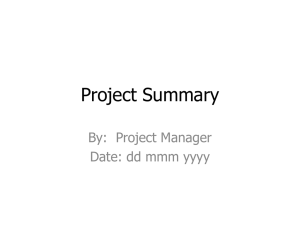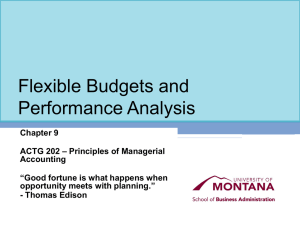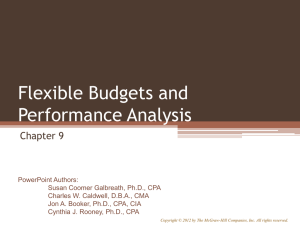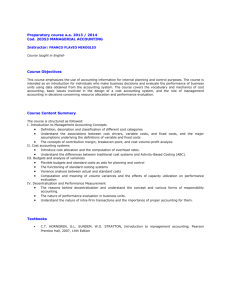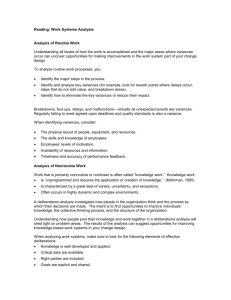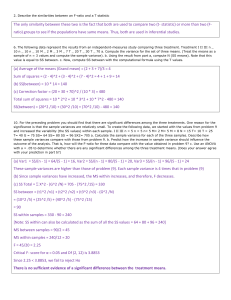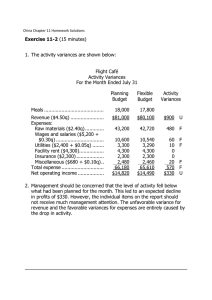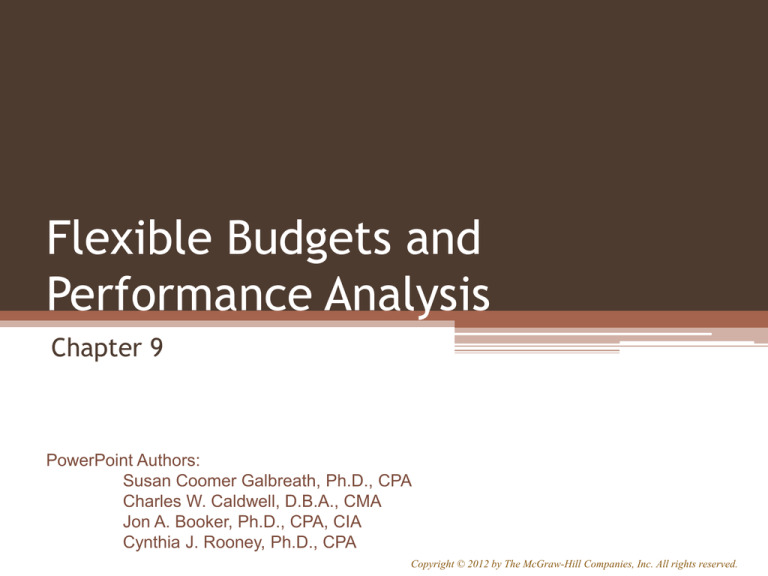
Flexible Budgets and
Performance Analysis
Chapter 9
PowerPoint Authors:
Susan Coomer Galbreath, Ph.D., CPA
Charles W. Caldwell, D.B.A., CMA
Jon A. Booker, Ph.D., CPA, CIA
Cynthia J. Rooney, Ph.D., CPA
Copyright © 2012 by The McGraw-Hill Companies, Inc. All rights reserved.
9-2
Learning Objective 1
Prepare a flexible
budget.
9-3
Characteristics of Flexible Budgets
Planning budgets
are prepared for
a single, planned
level of activity.
Performance
evaluation is difficult
when actual activity
differs from the
planned level of
activity.
Hmm! Comparing
static planning budgets
with actual costs
is like comparing
apples and oranges.
9-4
Characteristics of Flexible Budgets
May be prepared for any activity
level in the relevant range.
Show costs that should have been
incurred at the actual level of
activity, enabling “apples to apples”
cost comparisons.
Help managers control costs.
Improve performance evaluation.
Let’s look at Larry’s Lawn Service.
9-5
Deficiencies of the Static Planning
Budget
Larry’s Lawn Service provides lawn care in a planned
community where all lawns are approximately the same size.
At the end of May, Larry prepared his June budget based on
mowing 500 lawns. Since all of the lawns are similar in size,
Larry felt that the number of lawns mowed in a month would
be the best way to measure overall activity for his business.
Larry’s Budget
9-6
Deficiencies of the Static Planning
Budget
Larry’s Planning Budget
9-7
Deficiencies of the Static Planning
Budget
Larry’s Actual Results
9-8
Deficiencies of the Static Planning
Budget
Larry’s Actual Results Compared with the Planning Budget
9-9
Deficiencies of the Static Planning
Budget
Larry’s Actual Results Compared with the Planning Budget
F = Favorable variance that occurs when actual
revenue is greater than budgeted revenue.
U = Unfavorable variance that occurs when
actual costs are greater than budgeted costs.
F = Favorable variance that occurs when
actual costs are less than budgeted costs.
9-10
Deficiencies of the Static Planning
Budget
Larry’s Actual Results Compared with the Planning Budget
Since these variances are unfavorable, has
Larry done a poor job controlling costs?
Since these variances are favorable, has
Larry done a good job controlling costs?
9-11
Deficiencies of the Static Planning
Budget
I don’t think I
can answer the
questions using
a static budget.
Actual activity is above
planned activity.
So, shouldn’t the variable
costs be higher if actual
activity is higher?
9-12
Deficiencies of the Static Planning
Budget
The relevant question is . . .
“How much of the cost variances are due to
higher activity and how much are due to cost
control?”
To answer the question,
we must
the budget to the
actual level of activity.
9-13
How a Flexible Budget Works
To
a budget, we need to know that:
▫ Total variable costs change
in direct proportion to
changes in activity.
▫ Total fixed costs remain
unchanged within the
relevant range.
Fixed
9-14
How a Flexible Budget Works
Let’s prepare a
budget
for Larry’s Lawn
Service.
9-15
Preparing a Flexible Budget
Larry’s Flexible Budget
9-16
Quick Check
What should the total wages and salaries cost
be in a flexible budget for 600 lawns?
a. $18,000.
b. $20,000.
c. $23,000.
d. $25,000.
9-17
Quick Check
What should the
be the
totaltotal
wages
wages
andand
salaries
salaries
cost
costinina aflexible
be
flexiblebudget
budgetforfor600
600lawns?
lawns?
a. $18,000.
$18,000
b. $20,000.
c. $23,000.
d. $25,000.
Total wages and salaries cost
= $5,000 + ($30 per lawn 600 lawns)
$5,000 + $18,000 = $23,000
9-18
Learning Objective 2
Prepare a report showing
activity variances.
9-19
Activity Variances
Planning
budget revenues
and expenses
Flexible
budget revenues
and expenses
The differences between
the budget amounts are
called activity variances.
9-20
Activity Variances
Let’s use
budgeting
concepts to compute activity
variances for Larry’s Lawn Service.
9-21
Activity Variances
Larry’s Flexible Budget Compared with the Planning Budget
9-22
Activity Variances
Larry’s Flexible Budget Compared with the Planning Budget
Activity and revenue increase by 10 percent, but net operating income
increases by more than 10 percent due to the presence of fixed costs.
9-23
Learning Objective 3
Prepare a report showing
revenue and spending
variances.
9-24
Revenue and Spending Variances
Flexible budget revenue
Actual revenue
The difference is a revenue variance.
Flexible budget cost
Actual cost
The difference is a spending variance.
9-25
Revenue and Spending Variances
Now, let’s use
budgeting
concepts to compute revenue and
spending variances for Larry’s Lawn
Service.
9-26
Revenue and Spending Variances
Larry’s Flexible Budget Compared with the Actual Results
$1,750 favorable
revenue variance
9-27
Revenue and Spending Variances
Larry’s Flexible Budget Compared with the Actual Results
Spending
variances
9-28
Learning Objective 4
Prepare a performance
report that combines
activity variances and
revenue and spending
variances.
9-29
A Performance Report Combining Activity and
Revenue and Spending Variances
Now, let’s use
budgeting
concepts to combine the revenue and
spending variances reports for Larry’s
Lawn Service.
9-30
A Performance Report Combining Activity and
Revenue and Spending Variances
9-31
A Performance Report Combining Activity and
Revenue and Spending Variances
50 lawns × $75 per lawn
50 lawns × $30 per lawn
9-32
A Performance Report Combining Activity and
Revenue and Spending Variances
$43,000 actual - $41,250 budget
9-33
Performance Reports in Non-Profit
Organizations
Non-profit organizations may receive funding from
sources other than the sale of goods and services,
so revenues may consist of both fixed and
variable elements.
State funding
Donations
Tuition and fees
Endowments
Universities
9-34
Performance Reports in Cost Centers
Performance reports are often prepared
for cost centers. These reports should be
prepared using the same principles
discussed so far, except for the fact that
these reports will not contain revenue or
net operating income variances.
9-35
Learning Objective 5
Prepare a flexible budget
with more than one cost
driver.
9-36
Flexible Budgets with Multiple Cost
Drivers
More than one cost
driver may be needed to
adequately explain all of
the costs in an organization.
The cost formulas used
to prepare a flexible
budget can be adjusted
to recognize multiple
cost drivers.
9-37
Flexible Budgets with Multiple Cost
Drivers
Because of the large unfavorable wages and salaries spending
variance, Larry decided to add an additional cost driver for
wages and salaries. The variance is due primarily to the number
of hours required for the additional edging and trimming. So
Larry estimates the additional hours and builds those hours into
both his revenue and expense budget formulas.
Larry’s New Budget
9-38
Flexible Budgets with Multiple Cost
Drivers
Larry’s Budget Based on More than One Cost Driver
9-39
Learning Objective 6
Understand common
errors made in preparing
performance reports
based on budgets and
actual results.
9-40
Some Common Errors
The most common errors when preparing performance
reports are to implicitly assume that:
1. All costs are fixed, or that;
2. All costs are variable.
Assume all costs are fixed.
9-41
Common Error 1: Assuming All Costs
Are Fixed
Faulty Analysis Comparing Budgeted Amounts to Actual Amounts
9-42
Common Error 2: Assuming All Costs
Are Variable
Faulty Analysis that Assumes All Budget Items Are Variable
9-43
End of Chapter 9

